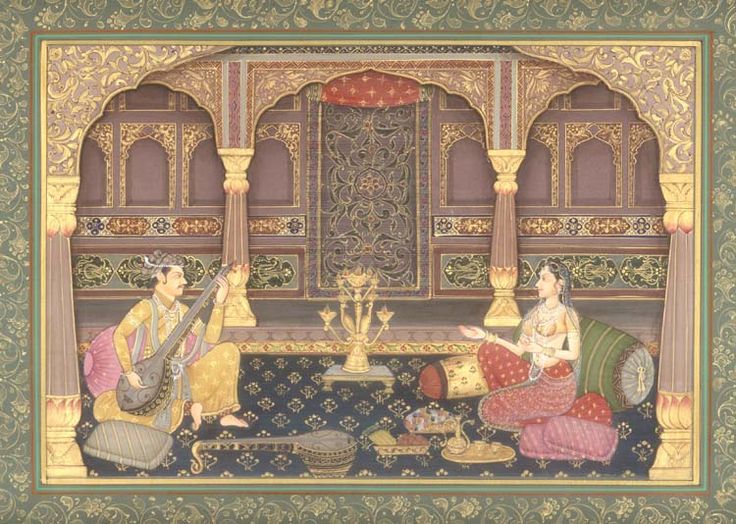In the jungles near Gwalior, India, resided a renowned Guru and his disciples. One evening at around twilight, the disciples went into the jungle to get woods for cooking. As they were cutting and collecting them, they heard the roar of a lion from behind the bushes. The disciples were afraid so they ran back to their ashram to inform Guru. The master said, ‘It is not possible to find a lion here, show me the place where you heard the roar.” Disciples directed the Guru to the place near the bushes. And Guru too heard the roar. Quietly he went behind the bushes and after a while came out to show the disciples “Here is your lion.” Everyone was surprised to see the Guru holding a naughty young child. The child was very innocent, bright and brave.
Very lovingly, Guru asked the child, “How many other voices can you imitate?” and the child enthusiastically performed and perfectly imitated the voices of many birds and animals that he had heard over time. Guru asked his father’s name and home address. He made him eat dinner with the other children. Guruji came to Gwalior with the child to meet his father Makarand Pandey who himself was a renowned musician.
Guru requested Pandeyji, “Your son is very bright and has a potential to become a great Music maestro. Let him be under my guidance.”
Father handed over his son under the tutelage of the Guru and the child bowed down to his parents seeking their blessings, and hugged them before leaving with his Guru.
The Guru was none other than the Renowned “Sangeet Acharya” (Music maestro) Swami Haridas and the child was Swar Samrat Tansen.
Tansen, whose real name was Ramtanu, had four sons; Suratsen, Tanras Khan, Hamir Sen and Bilas Khan; and one daughter, Saraswati Devi.
When Tansen passed away on 26th April 1589, Bilas Khan sat alone beside the body. It is said that while trying to sing Todi, his father’s favourite raga, at his father’s wake, Bilas was so grief-stricken that he mixed up the notes. That gave birth to a new raga, and Tansen’s corpse moved one hand in approval of the new melody. It came to be known as ‘Bilaskhan-i Todi.’
Bilaskhan-i Todi – is a Hindustani classical raga. This Raag belongs to Bhairavi Thaat. Raag Bhairavi and Raag Komal-Rishabh Asawari are nearest to Bilaskhan-i Todi. It is a very melodious but difficult Raag to sing and requires much Riyaaz (daily practice). This Raag can be expanded in all the three octaves. The atmosphere created by it is deep and soothing.
Bilas Khan was famous for his Raag Todi. He had a daughter who remained unmarried in order to take care of her father. Whenever Bilas Khan would practice his music (riyaaz), the daughter would always sit by his side and appreciate with her “daad” – acknowledging his virtuous singing. This was their routine for years.
Once it so happened that while offering daad to her father’s singing, the daughter coughed very badly. Bilas khan was shocked and stopped his practice. Hakim sahib was called immediately, and upon proper examination, he diagnosed that the daughter was suffering from the deadly ailment of tuberculosis.
Bilas Khan repented and atoned very deeply as he felt responsible for ignoring and forgetting about his darling daughter’s wellbeing while rehearsing his Raag Todi, his music. He was very apologetic to his daughter and cried in deep agony. In his extreme regret he decided not to sing Raag Todi ever again. He left his music and rendered his life to daughter’s care.
Now for Bilas Khan, his daughter’s care and praying for her recovery were the only things left in his life. For days and nights, Khan saab did his best to take care of his daughter but there was no improvement. Her health was deteriorating each day. It was felt that now the end was near; with teary eyes Bilas Khan took his daughter’s hand in his hand and asked, ” मेरे बच्चे, कोई आख़री ख़्वाहिश?“ (My Child, any last wish?)
With a feeble smile on her frail face she said “अब्बा, एक आख़री बार आप की तोडी सुना दीजिये” (Abba, please sing your Todi for me one last time.)”
Bilas Khan took the Sitar in his trembling hand and for the last time in his life sang his Raag Todi. In one hand was the Sitar, flowing tears in his eyes and the melody coming from the deepest core of his heart… Raag Bilaskhan-i Todi…. all his dreams and aspirations were drowned in his music…the Raag got over, the song ended and so did his loving daughter’s last breath.
बड़े गौर से सुन रहा था ज़माना
हम ही सो गए दास्तान कहेत कहते ।
Bade gaur se sun raha tha zamaana
hum hi so gaye daastan kahete kahete.
Everyone was listening very attentively
I only went to sleep while narrating my story.
Yes, It’s Father’s Day today….HAPPY FATHER’S DAY !!!
The story reminded me of a similar situation in film “Parichay” (1972) where the Music Maestro was terminally ill and his daughter was taking his care….listen to this classical heart stirring song. – https://www.youtube.com/watch?v=Jk7hqqtd9bY


Lovely as usual. It reminded me of many things. ‘Flow’ – the sense of getting lost in one’s work that one forgets the real world. And when you wake up is it sometimes too late. So if FLOW often described as the best place to be when working as good as it is touted to be. Struggling with this for quite some time
Nostalgic. Beautiful way to end the blog with a powerful melody. Last evening I ended my life show on FB with this song and I was in tears and had to abruptly end the show. Keep writing.
Touchy tribute on Fathers Day with musical connect.
Very absorbing and innovative.
New aspects are always born out of commitment and beliefs.
A father’s commitment to his children and family well as a teacher’s commitment to his students and academics can never be matched.
HAPPY FATHER’S DAY.
Fathers!!
Thanks Rajiv.
Salute to my father. And to your. And everyone else’s. They will give away their everything to give us everything, absolutely selflessly.
Flow, is such a unique thing. In a crisis sometimes it is best to go with it and that helps reduce stress. Yes, HAPPY FATHER’S DAY !
Rajivbhai, Beautiful as usual. Kya baat.
Yes very heart touching story. As we mature we should look at life more closely ,value it’s presence and grateful to God for what we have been given. Keep sharing such stories.
Rajiv,
You have mastered a art of expressing to words ,I always await your posts ,
I have watched parichay many times , very nice movie mix of everything.
Thanks for sharing
Heart Touching
Beautiful message on Father’s Day. A very well crafted touchy story describing humble love between Father and Daughter.
Very touchy and live. Enjoyed reading and hearing too 😊 👍
Very very interesting, once again, Rajiv ji. The relationship beautifully shown between the creator and the creation in your writing which flows like a spring.
The rag is indeed very soothing, blending Bhakti with Melancholy, transcending oneself from sadness to surrendering to the universal designs
Rajiv bhai, you are sharing your vast knowledge in variety of fields. Every two weeks I keep wondering now which topic I get to know!
Such details of “That” and its different “Raag” and its “Swar” I am impressed.
Happy Father’s Day starts with Makarand Pandey, who sent his son with a music Masterao and his son’s hidden talent is brought out and polished to shine and at the end the father who is looking after his daughter leaving his own “Riyaz” choosing to be with the daughter .
Very melodious song at the end !
आपने तो रुला दिया ।